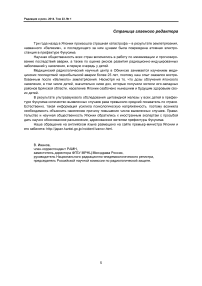Страница главного редактора
Статья в выпуске: 1 т.23, 2014 года.
Бесплатный доступ
ID: 170170142 Короткий адрес: https://sciup.org/170170142
Текст ред. заметки Страница главного редактора
Наше обращение на английском языке размещено на сайте премьер-министра Японии и его кабинета:
В. Иванов, член-корреспондент РАМН, заместитель директора ФГБУ МРНЦ Минздрава России, руководитель Национального радиационно-эпидемиологического регистра, председатель Российской научной комиссии по радиологической защите.
Viktor Ivanov, Professor, Correspondent Member of the Russian Academy of Medical Sciences, Chairman of the Russian Scientific Commission on Radiological Protection, Director of WHO Collaborating Center for Research and Training on Radiation Epidemiology
Dear residents of the Fukushima Prefecture,
I am Professor Viktor Ivanov, Deputy Director of the Medical Radiological Research Center of the Russian Ministry of Health in Obninsk, and expert in radiological protection of the public and nuclear workers. On a special occasion of a Happy New Year, 2014, I wish to share our own experience and data with the Japanese people to logically grasp the current situation of Fukushima and to avoid misunderstanding and groundless prejudice of radiation risk especially on childhood thyroid cancers in Fukushima.
Since the first days following the Chernobyl accident in April 1986 I participated in mitigation of the consequences of the accident and building up the All-Union Registry of people affected by the Chernobyl accident, including the public and clean-up workers arrived at the Chernobyl NPP from all corners of the Soviet Union. The Registry was established as soon as in the summer 1986. In five years, by December 1991, when the Soviet Union collapsed, the Registry Database contained individual medical and dosimetric information for about 659 thousand persons, of them 342 thousand were residents of affected territories. It was possible due to close cooperation with our Japanese colleagues. Now in the Russian National Radiation Epidemiological Registry we have followed-up about 700 000 thousand of people affected by the Chernobyl accident.
Since 2011 I am involved in the group of foreign experts on prognosis of health effects of the Fukushima accident. I have participated in international meetings on the Fukushima accident held in Japan and Vienna. I visited the Fukushima-Daiichi Nuclear Power Plant (FDNPP), Fukushima prefecture and the affected settlements, contacted their residents in September 2011. My knowledge and experience of 27-year follow-up of Russian people affected by the Chernobyl accident allows me to make prognosis of health consequences of the Fukushima accident in the population of the Fukushima prefecture and clean-up workers on the basis of the Chernobyl data.
Nearly two and a half years since the earthquake/tsunami event of March 2011 thyroid cancer cases were detected in children residing in the Fukushima Prefecture as a result of the large-scale ultrasound screening for thyroid abnormalities. A natural question arises: “Are detected thyroid cancer cases associated with the exposure to radiation following the Fukushima accident?”.
To answer the question let us examine the main findings of post-Chernobyl epidemiological studies of childhood thyroid cancer incidence published in leading scientific journals. The following three basic conclusions were drawn from the studies:
-
1. Latency period for radiation-induced thyroid cancer in children is no less than 5 years.
-
2. No increase in thyroid cancer incidence was detected in children with thyroid dose from incorporated I-131 lower than 150-200 mGy.
-
3. Due to large-scale screening for thyroid cancer the incidence of the disease was found to increase 6-8-fold in territories both affected and non-affected by the Chernobyl accident.
With account of three findings of epidemiological studies we can draw the general conclusion that detected thyroid cancer in children of Fukushima Prefecture are not induced by the accident at the Fukushima NPP. At the same time it is necessary to continue estimating radiation doses and assessment of possible radiation risks of cancer in residents of Fukushima prefecture.
Though scientific evidence suggests that no dramatic health consequences are expected, however the Fukushima accident, as any radiological event, causes significant psychological and social problems.
I hope that my article with scientific facts will help you reduce your worrying about your physical health and prevent stress-related illness. I wish you to look to future without fear but with confidence.
Yours sincerely
Viktor Ivanov
Obninsk, Russia


